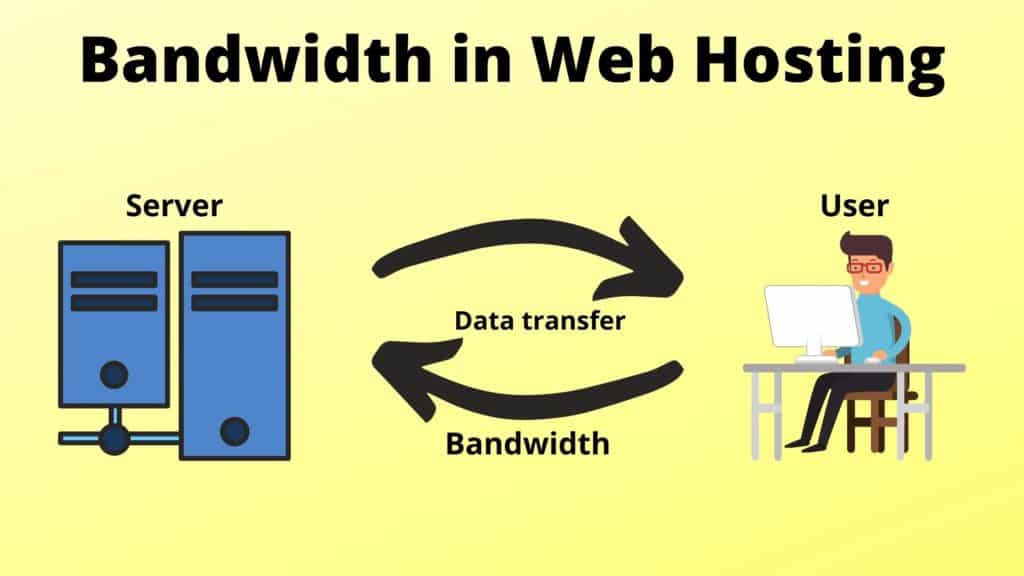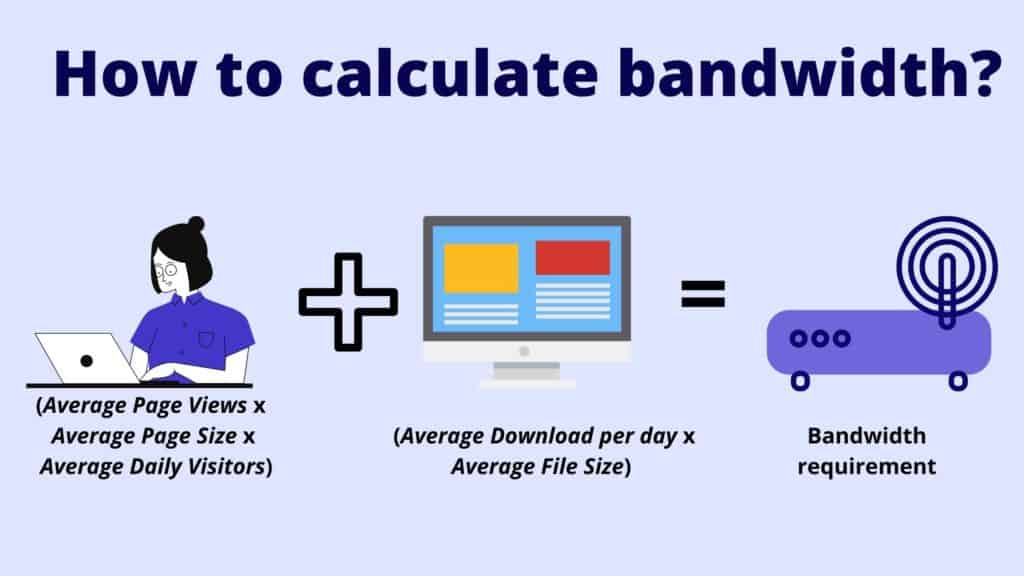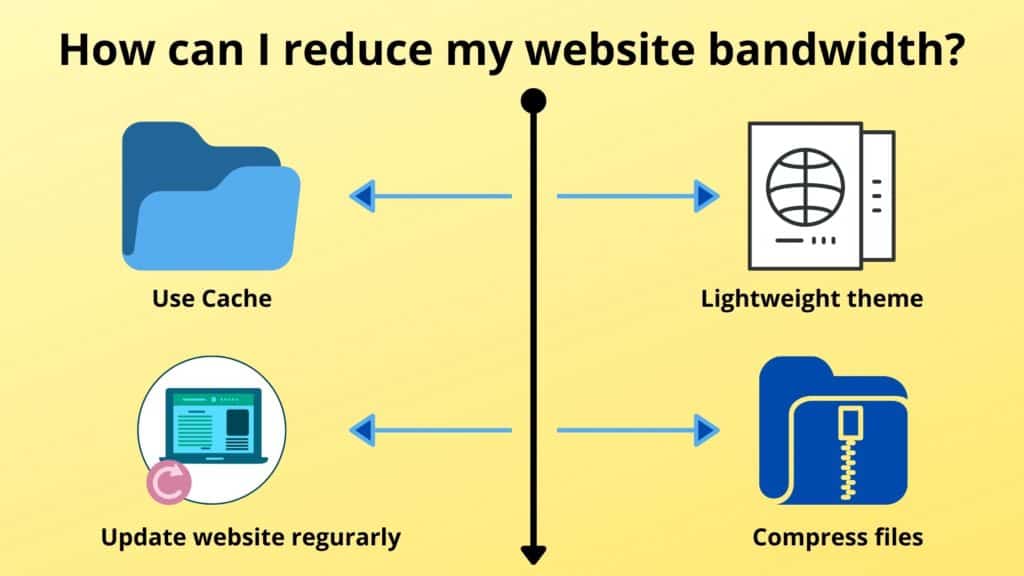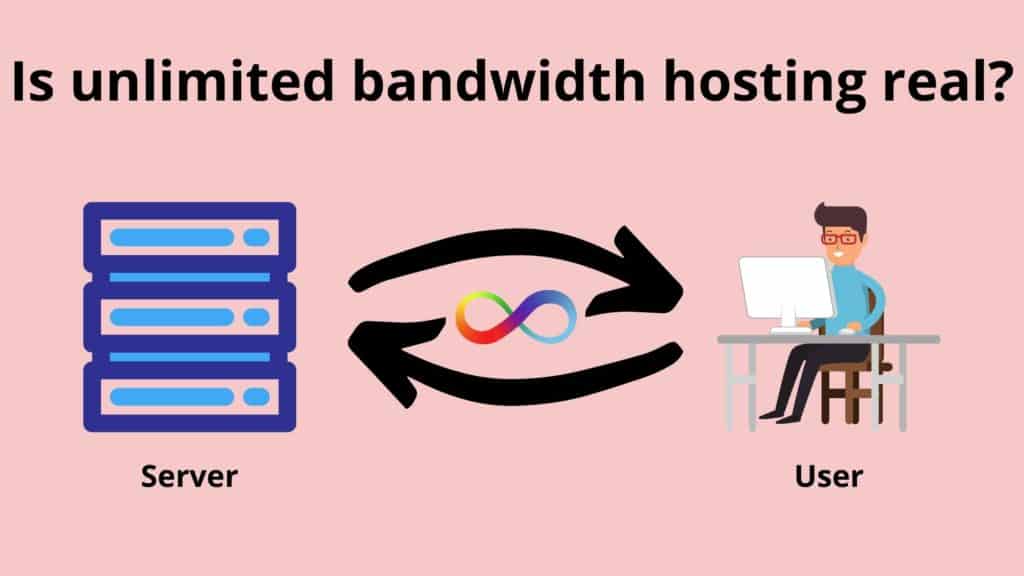Understanding bandwidth is important, whether you are a beginner or a professional. I thought of writing this dedicated article about Bandwidth in Web Hosting as many users are confused with this.
In this article, I am going to clear all your doubts around Web Hosting Bandwidth. I will cover everything from its meaning and importance to how you can calculate and reduce your website bandwidth with some simple tricks.
Also, I will answer some frequently asked questions about Bandwidth in Web Hosting, so do stick with me till the end of the article. So, without any further delay, let’s get started!
- What is Bandwidth?
- What is Website Bandwidth? Is It Important?
- How Much Bandwidth Does My Website Need? How To Calculate It?
- How Can I Reduce My Website Bandwidth?
- Is Unlimited Bandwidth Hosting Real?
- What Happens If I Exceed My Bandwidth?
- How To Choose A Hosting Which Provides Good Bandwidth?
- Video Bandwidth
- Conclusion
What is Bandwidth?
Bandwidth can be termed as the amount of data (data of the website) that can be transferred from the server to the user. If my website kripeshadwani.com consists of an image and text of data 2 megabytes (MB), and suppose 10 people visit the website. Then my website is consuming 20 MB of bandwidth, from the available bandwidth of 1 TB (bandwidth capacity).

If this is getting complicated, here’s an example.
Consider a highway, where there are 2 toll booths (your website with 10 MB bandwidth). This means only two cars can pay the toll at once. This means, only 5 people can access my website (if the website is of data 2MB) simultaneously or can access it without any problem.
When there is huge traffic during peak travel time, there might be a problem. You might have to wait longer to access the toll booth. Similarly, if your website has more visitors not recommended for the bandwidth, your website might go down, the visitors might face a longer loading time.
So, the website is difficult to access during heavy traffic if the bandwidth is low. Whereas if there are 5 or more toll booths, then the movement of cars is smoother and faster. Similarly, the more bandwidth the website has, the faster and smoother it runs without any problem. You can get more traffic without facing any problems.
What is Website Bandwidth? Is It Important?
Website bandwidth is measured in terms of maximum data that can be transferred in a specified time. It is usually considered in seconds, and hence the bandwidth is often expressed in terms of gigabytes or megabytes per second (GBps/MBps).
Bandwidth becomes important when the website has a sudden surge in traffic, resulting in website crash or failure if the bandwidth provided by the hosting company is low. Hence, it is crucial to check the bandwidth rate provided by the hosting company.
You can check your website bandwidth in Hostinger under Order Usage. You get different factors like bandwidth usage, CPU usage, memory, processes, requests for your websites and more detailed reports. Different providers have different reports, so do check with your hosting providers.
How Much Bandwidth Does My Website Need? How To Calculate It?
Calculating bandwidth is not necessary for beginners, which is applicable for websites with a minimum audience. However, as your website has more visitors, you tend to exceed the bandwidth of the current plan. Hence, to calculate the bandwidth you need to know the basic ideas.

To calculate you need to know the different factor of your website which are mentioned below.
Monthly visitors: Check the average monthly visitors for your website. You can take the help of Google Analytics or WordPress.
Pageviews: How many pages the visitors open when they visit your website?
Average Daily Visitors: The total number of monthly visitors/ 30.
Average Page Views: The average page viewed per visitor
Webpage size: You need to know the size of the web pages your website or blog has. Try online tools like GTmetrix, Northcutt or Pingdom.
Average File Size: The total file size divided by the number of files.
Average Page Size: The average size of your web page.
After considering the above information, it pretty much narrows down to one equation.
Your Bandwidth need = [(Average Page Views x Average Page Size x Average Daily Visitors) + (Average Download per day x Average File Size) ] x30 (Number of days in a month) x Redundant Factor
Redundant Factor: A safety factor that ranges from 1.3 – 2 (average value is 1.5). This is the factor to balance the extra traffic you might get at times.
If this calculation is confusing, which it sometimes can be, you can try some online website bandwidth calculator to get a rough estimate.
Also, do read this article from Google, which gives different factors to consider while uploading a video. This article is based on YouTube, which is one of the best video hosts in itself!
How Can I Reduce My Website Bandwidth?

If you are not planning to upgrade your current hosting plan, and need to reduce the bandwidth, you can do it in several ways.
1. Cache
Always use a good cache system as a good cache system helps your website a lot by reducing the load on your website. For example, for WordPress, you can use the W3 Total cache system. The web hosts also do provide cache plugins.
2. Lightweight theme
Your website will load faster when you use a lightweight theme. It consumes fewer resources which directly helps to load the website faster.
3. Content Delivery Network (CDN)
This is recommended for websites that get visitors from across the globe. CDN is when you place your files, cached versions (HTML, Javascript, CSS, images, videos etc ) in different servers across multiple locations (countries).
4. Do not use Nulled themes/plugins
It is not recommended to use nulled themes/plugins because they might contain malware or viruses which consume the resources of your website, directly affecting your bandwidth.
5. Update your website regularly
Updating your website regularly greatly improves your website. At times, the themes or plugins may consume more resources, which might be fixed in an update.
6. Compress files
The easiest one is to compress the files (images, videos, HTML, Javascript and CSS) by using GZip. You can also resize the images and videos if possible.
7. Combining similar files
You can combine the Javascript and CSS files, hence reducing the number of HTTP requests for your page, in turn making your webpage faster. You can combine all external Javascripts into a single Javascript file, and do the same for CSS files, combining them into one single CSS stylesheet file.
Is Unlimited Bandwidth Hosting Real?

Wondering if the plan includes unlimited bandwidth? No, there is no such thing as unlimited bandwidth, similar to unlimited mobile data. This might be a bit misleading as every web host provider has bandwidth limits in the plans they offer.
This sounds like a great deal, but it’s a bit complex. It simply means unmetered bandwidth, where the server speed will be limited but the amount of data that can be processed is unlimited.
The websites on a shared hosting never exceed the possible bandwidth provided, hence the term is used.
What Happens If I Exceed My Bandwidth?

Every web host provides a limit for bandwidth usage. But what happens if you exceed the limit? This is called Error 509 which means the bandwidth limit exceeded, one of the most common errors. This happens when your server is overloaded. You can track the time your website has been down by using UptimeRobot. One of the following things will happen when you exceed your bandwidth limit,
- The host may suspend your website temporarily. You will be notified that the website has exceeded the bandwidth limit, where you can either upgrade your plan, or the website will be suspended for some time.
- The host may also charge you extra fees (in the form of fine/over usage fees).
- The host may also auto-upgrade your hosting plan to the next greater plan so that you have extra bandwidth.
So, it is recommended to check the host provider’s policy of what happens when you exceed your bandwidth.
How To Choose A Hosting Which Provides Good Bandwidth?
If your website is new or has average to medium traffic (up to 1.5 lakh per month), then shared hosting plans by Hostinger, FastComet, A2 Hosting, HostArmada, and ChemiCloud are some pretty good options that provide the required bandwidth in their plans and you won’t face any problem regarding bandwidth.
But if you start getting more traffic and plan to upgrade, then managed Fastcomet VPS, Cloudways, A2 VPS and Hostinger VPS are other good options.
If your website is a video browsing website or has many videos, then do read about video bandwidth below.
Video Bandwidth
Websites with videos and high-quality images usually require greater bandwidth when compared to simple websites. So, can we use the same host for websites with videos, video-streaming or high-quality images downloading websites? You can use the same host as long as your traffic is minimum. If you start to get more visitors, then choosing an object storage host is the better option.
First, how to calculate the video file size? To calculate, you need,
- Time duration of the video (length – 10 seconds, 2 minutes).
- Frames per second (fps) of the video.
- Amount of horizontal and vertical pixels.
- Bit Depth of the image is the number of bits per pixel. More pixels implies more colours in the video.

The formula is Number of Frames * File size of Frames.
The number of Frames can be calculated by multiplying the Frame rate (fps) with Time in seconds.
File size of frames equals (Horizontal pixels * Vertical pixels * Bit Depth) / 8*1024.
You can alternatively use the online video bandwidth calculator.
If you want to change your web host to support your websites with videos or downloadable high-quality images, then the recommended host is Digital Ocean, which also comes with free CDN. Other options include Amazon S3 and Linode.
Conclusion
In conclusion, understanding bandwidth in web hosting is very important. I hope this article helped you better understand what is bandwidth, how it works and why it is important to consider while choosing the right host for your website.
If you enjoyed reading this article, you can subscribe to my Newsletter for more informative content. And if you have any doubts regarding web hosting bandwidth, feel free to leave them in the comments section below. I will be glad to answer them.
This is Kripesh signing off! Take care and keep learning! 🙂
